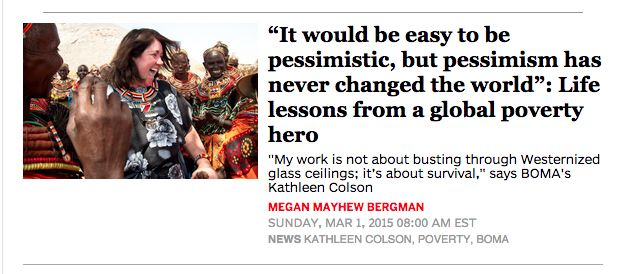The theme of International Women’s Day this Sunday is “Make it Happen” (#makeithappen). Thanks to your support BOMA has been making good things happen for women in Northern Kenya for nearly a decade.
Today on Salon.com renowned author Megan Mayhew Bergman interviews BOMA cofounder Kathleen Colson from her new home in Kenya.
Here’s an excerpt:
Why focus your efforts on women?
In all those journeys, what became really obvious is that women, children and the elderly were the most vulnerable. They were the ones that suffered the most. As climate change has started to devastate the arid lands of Africa, you see men leaving their home villages with the livestock, taking them to distant grazing lands. The women and children used to travel with the men, but it’s become too dangerous as the grazing lands and water disappear. Dwindling resources means more conflict.
The women are left to survive without livestock or money. The livestock could be 60 percent of their caloric intake. Women and children are extremely vulnerable during drought.
In some places, the nomadic pastoralists in the drylands of Africa are now settling – because of ethnic conflict, but also because they want to send their children to school and to be eligible for food aid. Settling is a coping strategy – a survival strategy – to have access to medical care and food.
We focus on women because they’re the most vulnerable during droughts, as well as their children. These women will only be able to survive if they can earn money to feed their children.
What do you wish the average person knew about life as a woman in northern Kenya?
These women survive despite incredible hardships. It is the most humbling thing to see the courageous nature of these women, how they live their daily lives. It’s inspiring.
I wish people knew how hard they work. They’re like mothers everywhere. They cry when their kids get sick. They dance and sing with their children when life is good. They get up before dawn to cook for their children. They carry firewood and water for their families.
They have extraordinarily big hearts. They are incredibly generous.
Now that I’ve been a practitioner in the field of global poverty, I know this: There are no people more generous than those who live in extreme poverty. People share no matter what. They care for others even though they have very little for themselves.
When you are a witness to extreme poverty, you start to learn about what’s important.
Read more of Megan Mayhew Bergman’s interview with Kathleen Colson here.

